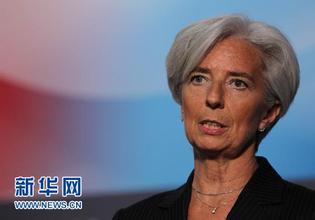

 |
| IMF Managing Director Christine Lagarde (File photo/Xinhua) |
Washington's use of its de facto veto at the International Monetary Fund to block reforms which will give emerging countries a greater say is jeopardizing the IMF's credibility, IMF Managing Director Christine Lagarde said at the Fund's annual meeting in Lima, Peru, according to AFP.
In fact the reforms were originally propelled by Washington with the aim of doubling the IMF funding and relocating voting power to boost China and other up-and-coming economic powers.
China only has 4 percent voting power in the IMF according to the current rules though it is the second largest economy. Its voting power will rank third following the U.S. and Japan after the reforms. The European media believe the U.S. blocking IMF reforms is targeted at China.
"We strongly hope the U.S. Congress starts taking some responsibility again for international financial institutions, to avoid isolation at a time of growing Chinese influence," said Jeroen Dijsselbloem, President of the Eurogroup, according to Reuters.
Is the U.S. the biggest block for China to expand its influence? Jiang Yong, a researcher of Institutes of Contemporary International Relations, said the biggest function of the IMF for the U.S. is to stabilize international exchange rate and keep U.S. dollar as a strong currency. In his opinion, the IMF is a tool for the U.S. to deal with its debtors. He added that the IMF plays a smaller role for the U.S. since more and more developing countries have become creditors while more developed ones have become debtors.
Jiang believes that the U.S. tries to force China to accept more requirements. The U.S. tries to crimple China’s bargaining chip after drawing China to the IMF.
This article was edited and translated from 《美國(guó)阻撓IMF改革 引發(fā)多方輿論“憤怒轟炸》, source: Global Times, author: Wang Hailin,Du Tianqi,Qing Mu
 Photos of beautiful teacher hit the Internet
Photos of beautiful teacher hit the Internet Winding mountain road
Winding mountain road
 Math teacher makes 'solar powered electric car'
Math teacher makes 'solar powered electric car' Heavy traffic turns expressway into huge parking lot
Heavy traffic turns expressway into huge parking lot Chinese-American girl selected as Rose Parade princess
Chinese-American girl selected as Rose Parade princess Top 10 nominated designs at BJDW
Top 10 nominated designs at BJDW Fashion show staged in Forbidden City at night
Fashion show staged in Forbidden City at night Construction of HK-Zhuhai-Macao Bridge enters final stage
Construction of HK-Zhuhai-Macao Bridge enters final stage Art photos of Chinese beauty in Han Chinese clothing
Art photos of Chinese beauty in Han Chinese clothing On a collision course
On a collision course China exports elite education
China exports elite education Chinese firms bid for Australian cattle ranch
Chinese firms bid for Australian cattle ranch UNESCO honors Nanjing Massacre memories
UNESCO honors Nanjing Massacre memoriesDay|Week